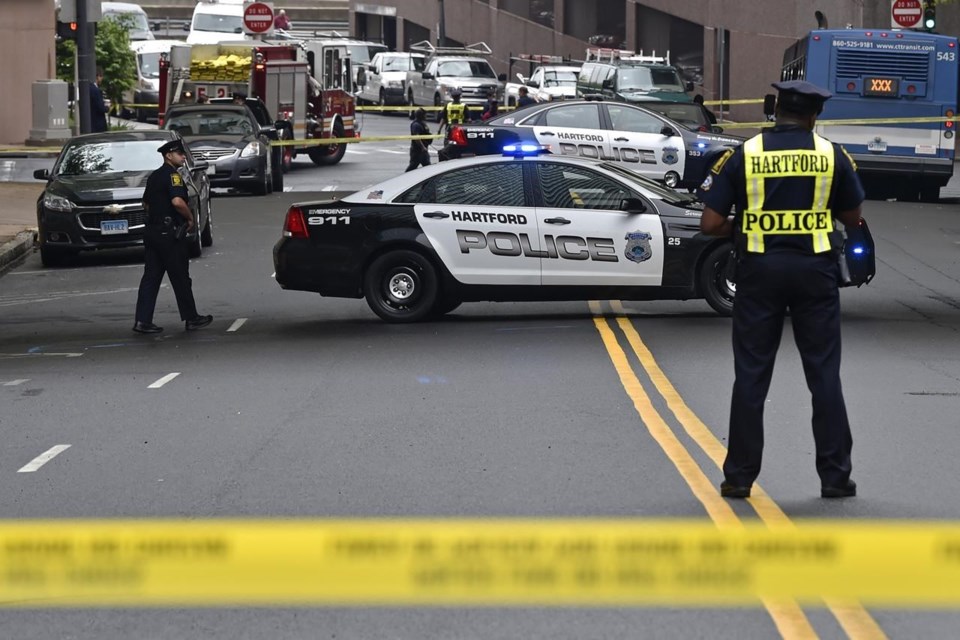HARTFORD, Conn. (AP) — A judge has ended the nearly 50 years of federal oversight of police in Hartford, Connecticut, despite continued concerns the department still has not hired enough minority officers to reflect the city's large Black and Hispanic populations.
U.S. District Judge Kari Dooley in Bridgeport issued a 10-page ruling late Friday saying the plaintiffs failed to prove the police department was violating any part of the original 1973 consent decree agreement or revisions made to it in 2010. Dooley approved the city's request to dissolve the consent decree, which was to have ended four years after the 2010 revisions but was later extended.
The consent decree was one of the longest in the country and resulted from a 1969 civil rights lawsuit against city police by several Hartford residents. The lawsuit accused police of inflicting numerous acts of violence, intimidation and humiliation upon Hartford citizens based on their race and ethnicity.
Sydney Schulman, a Hartford lawyer for the plaintiffs who has been involved in the case since 1969, said Monday that he was reviewing the ruling and would be contacting his clients about a possible appeal or other actions.
“I was totally shocked by getting the opinion," Schulman said. “I'm extremely concerned. ... It’s always been the position of the ... plaintiffs that the city of Hartford should have a police force that reflects the population of the city of Hartford, which is mostly minority."
“We need officers in Hartford who understand the culture and the community of color," he said. "We need officers who understand the city, who are living in the city or have lived in the city. We need officers who are out on the street and can work with community residents in order to avoid the violence that we’ve seen.”
Mayor Luke Bronin, a Democrat, said the city's commitment to improving diversity at the police department will not end because the consent decree has been dissolved. He also said in a statement that building trust and partnerships between the police department and city residents remains a priority.
“It’s important to recognize that the (consent decree) wasn’t just about recruitment, it was also about promoting transparency and accountability, increasing civilian oversight, and embracing best practices in policing,” he said. "And while that work is never done, the Hartford Police Department has been a leader in those areas here in Connecticut.”
A city police spokesperson did not return an email message seeking comment Monday.
Just last month, the city council passed a resolution calling for an indefinite extension of the consent decree until the police department fully complies with it.
In court papers filed in October, the plaintiffs said there has been little change in the racial and ethnic makeup of the department since the late 1960s. They said only about 35% of the 400-plus member force is non-white. According to the U.S. Census Bureau, about 36% of city residents are Black and 46% are Hispanic or Latino.
Corrie Betts, president of the Greater Hartford NAACP, called the judge's ruling troubling and disappointing. He said he would be talking to national NAACP officials about a response, including possible legal action.
“Given the troubling circumstances surrounding the Hartford police department, the decision really makes no sense at all,” Betts said.
Besides not hiring enough people of color, the plaintiffs also claim the department has not been complying with the consent decree because it has failed to conduct immediate investigations into some instances of officers discharging their firearms. They also said the force is not always taking sworn statements from citizens when seeking arrest warrants as required.
The judge, however, rejected all their arguments and noted police officials have provided evidence of their efforts to increase the recruitment and promotion of minority officers.
Schulman said that while the department has increased recruiting of minorities, many of them have had trouble passing police academy tests. Betts said the department hasn't done enough to change those tests so more Black and Hispanic officer candidates get hired.
In court papers, police officials say there have been numerous reforms at the department, and the consent decree and federal oversight were no longer warranted.
“The conditions present in 1969 that led to the federal jurisdiction are no longer present,” city lawyers wrote. “Simply put, over 50 years of litigation has exhausted any basis for continuing jurisdiction over this matter.”
Dave Collins, The Associated Press



